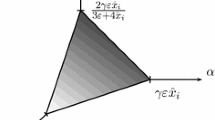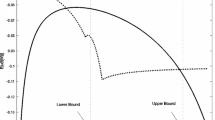Abstract
A celebrated result in the theory of tournaments is that relative performance evaluation (tournaments) is a superior compensation method to absolute performance evaluation (piece rate contracts) when the agents are risk-averse, the principal is risk-neutral or less risk-averse than the agents and production is subject to common shocks that are large relative to the idiosyncratic shocks. This is because tournaments get closer to the first best by filtering common uncertainty. This paper shows that, surprisingly, tournaments are superior even when agents are liquidity constrained so that transfers to them cannot fall short of a predetermined level. The rationale is that, by providing insurance against common shocks through a tournament, payments to the agents in unfavorable states increase and payments in favorable states decrease which enables the principal to satisfy tight liquidity constraints for the agents without paying any ex ante rents to them, while simultaneously providing higher-power incentives than under piece rates. The policy implication of our analysis is that firms should adopt relative performance evaluation over absolute performance evaluation regardless of whether the agents are liquidity (wealth) constrained or not.
Similar content being viewed by others
References
Bolton P, Dewatripont M (2005) Contract theory. MIT Press, Cambridge
Green J, Stokey N (1983) A comparison of tournaments and contracts. J Polit Econ 91: 349–364
Holmström B (1982) Moral hazard in teams. Bell J Econ 13: 324–340
Holmström B, Milgrom P (1987) Aggregation and linearity in the provision of intertemporal incentives. Econometrica 55: 303–328
Hueth B, Ligon E (2001) Agricultural markets as relative performance evaluation. Am J Agric Econ 83: 318–328
Innes R (1990) Limited liability and incentive contracting with ex-ante action choices. J Econ Theory 52: 45–67
Innes R (1993) Financial contracting under risk neutrality, limited liability and ex ante asymmetric information. Economica 60: 27–40
Innes R (1993) Debt, futures and options: optimal price-linked financial contracts under moral hazard and limited liability. Int Econ Rev 34: 271–295
Kolmar M, Sisak D (2007) Multi-prize contests as incentive mechanisms for the provision of public goods with heterogeneous agents. Working paper
Kim S (1997) Limited liability and bonus contracts. J Econ Manag Strategy 6: 899–913
Konrad KA, Kovenock D (2010) Contests with stochastic abilities. Econ Inquiry 48(1): 89–103
Konrad KA, Schlesinger H (1997) Risk aversion in rent-seeking and rent-augmenting games. Econ J 107(445): 1671–1683
Laffont JJ, Martimort D (2002) The theory of incentives; the principal-agent model. Princeton University Press, Princeton
Lazear EP, Rosen S (1981) Rank-order tournaments as optimum labor contracts. J Political Econ 89: 841–864
Malcomson JM (1984) Work incentives, hierarchy, and internal labor markets. J Political Econ 92(3): 486–507
Marinakis K, Tsoulouhas T (2009) Are tournaments optimal over piece rates under limited liability for the principal? North Carolina State University Working Paper
Mathews T, Namoro SD (2008) Participation incentives in rank order tournaments with endogenous entry. J Econ 95: 1–23
Nalebuff BJ, Stiglitz JE (1983) Prizes and incentives: towards a general theory of compensation and competition. Bell J Econ 14(1): 21–43
Riis C (2010) Efficient contests. J Econ Manag Strategy 19(3): 643–665
Skaperdas S, Gan L (1995) Risk aversion in contests. Econ J 105(431): 951–962
Theilen B (2003) Simultaneous moral hazard and adverse selection with risk averse agents. Econ Lett 79: 283–289
Tsoulouhas T (1999) Do tournaments solve the two-sided moral hazard problem?. J Econ Behav Org 40(3): 275–294
Tsoulouhas T (2010) Hybrid cardinal tournaments. Econ Bull 30(3): 2279–2288
Tsoulouhas T, Marinakis K (2007) Tournaments with ex post heterogeneous agents. Econ Bull 4(41): 1–9
Tsoulouhas T, Knoeber C, Agrawal A (2007) Contests to become CEO: incentives, selection and handicaps. Econ Theory 30: 195–221
Tsoulouhas T, Vukina T (1999) Integrator contracts with many agents and bankruptcy. Am J Agric Econ 81: 61–74
Tsoulouhas T, Vukina T (2001) Regulating broiler contracts: tournaments versus fixed performance standards. Am J Agric Econ 83: 1062–1073
Wu S, Roe B (2005) Behavioral and welfare effects of tournaments and fixed performance contracts: some experimental evidence. Am J Agric Econ 87: 130–146
Wu S, Roe B (2006) Tournaments, fairness, and risk. Am J Agric Econ 88: 561–573
Author information
Authors and Affiliations
Corresponding author
Rights and permissions
About this article
Cite this article
Marinakis, K., Tsoulouhas, T. A comparison of cardinal tournaments and piece rate contracts with liquidity constrained agents. J Econ 105, 161–190 (2012). https://doi.org/10.1007/s00712-011-0222-z
Received:
Accepted:
Published:
Issue Date:
DOI: https://doi.org/10.1007/s00712-011-0222-z




